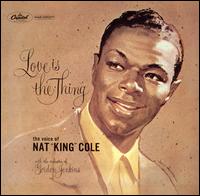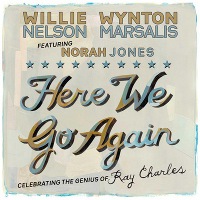
Atlantic Recording Corporation is an American record label founded in October 1947 by Ahmet Ertegun and Herb Abramson. Over the course of two decades, starting from the release of its first recordings in January 1948, Atlantic earned a reputation as one of the most important American labels, specializing in jazz, R&B, and soul by Aretha Franklin, Ray Charles, Wilson Pickett, Sam and Dave, Ruth Brown and Otis Redding. Its position was greatly improved by its distribution deal with Stax. In 1967, Atlantic became a wholly owned subsidiary of Warner Bros.-Seven Arts, now the Warner Music Group, and expanded into rock and pop music with releases by Crosby, Stills, Nash & Young, Led Zeppelin, and Yes.

Ray Charles Robinson Sr. was an American singer, songwriter and pianist. He is regarded as one of the most iconic and influential singers in history, and was often referred to by contemporaries as "The Genius". Among friends and fellow musicians he preferred being called "Brother Ray". Charles was blinded during childhood, possibly due to glaucoma.

I Never Loved a Man the Way I Love You is the tenth studio album by American singer Aretha Franklin released on March 10, 1967, by Atlantic Records. It was Franklin's first release under her contract with the label, following her departure from Columbia Records after nine unsuccessful Jazz standard albums, and marked a commercial breakthrough for her, becoming her first top 10 album in the United States, reaching number 2 on the Billboard 200. Two singles were released to promote the album: "Respect" and "I Never Loved a Man ". The former topped the Billboard Hot 100, while latter reached the top 10.

"Folsom Prison Blues" is a song by American singer-songwriter Johnny Cash. Written in 1953, it was first recorded and released as a single in 1955, and later included on his debut studio album Johnny Cash with His Hot and Blue Guitar! (1957), as the album's eleventh track. Borrowing liberally from Gordon Jenkins' 1953 song, "Crescent City Blues", the song combines elements from two popular folk styles, the train song and the prison song, both of which Cash continued to use for the rest of his career. It was one of Cash's signature songs. Additionally, this recording was included on the compilation album All Aboard the Blue Train (1962). In June 2014, Rolling Stone ranked it No. 51 on its list of the 100 greatest country songs of all time.

"What'd I Say" is an American rhythm and blues song by Ray Charles, released in 1959. As a single divided into two parts, it was one of the first soul songs. The composition was improvised one evening late in 1958 when Charles, his orchestra, and backup singers had played their entire set list at a show and still had time left; the response from many audiences was so enthusiastic that Charles announced to his producer that he was going to record it.

Modern Sounds in Country and Western Music is a studio album by American singer and pianist Ray Charles. It was recorded in February 1962 at Capitol Studios in New York City and United Western Recorders in Hollywood, and released in April of that year by ABC-Paramount Records.

Elvis Presley is the debut studio album by American rock and roll singer Elvis Presley. It was released by RCA Victor, on March 13, 1956, catalog number LPM-1254. The recording sessions took place on January 10 and January 11 at the RCA Victor Studios in Nashville, Tennessee, and on January 30 and January 31 at the RCA Victor studios in New York. Additional material originated from sessions at Sun Studio in Memphis, Tennessee, on July 5, August 19 and September 10, 1954, and on July 11, 1955.

The Genius of Ray Charles is a 1959 Ray Charles album, released in October by Atlantic Records, the seventh album since the debut Ray Charles in 1957. The album consists of swinging pop with big band arrangements. It comprises a first half of big band songs and a second half of string-backed ballads. The Genius of Ray Charles sold fewer than 500,000 copies and charted at number 17 on the Billboard 200. "Let the Good Times Roll" and "Don't Let the Sun Catch You Cryin'" were released as singles in 1959.
"I Got a Woman" is a song co-written and recorded by American R&B and soul musician Ray Charles. Atlantic Records released the song as a single in December 1954, with "Come Back Baby" as the B-side. Both songs later appeared on the 1957 album Ray Charles.

Anthology is the first compact disc to collect many of soul music icon Ray Charles' ABC-Paramount-era recordings. AllMusic considers it to be "the best single CD collection of Ray Charles' '60s and '70s ABC-Paramount material", while Rhino Records, the issuing label, refers to it in the liner notes as "the compact disc edition of Ray Charles' Greatest Hits", alluding to the two Rhino LPs issued the same year. It is one of the first CDs to be released by Rhino.
Jesse Albert Stone was an American rhythm and blues musician and songwriter whose influence spanned a wide range of genres. He also used the pseudonyms Charles Calhoun and Chuck Calhoun. His best-known composition as Calhoun was "Shake, Rattle and Roll".

Ladies' Choice is an album by American country music artist George Jones, released in 1984 on the Epic Records label. It was composed largely of duets with female artists.

The Battle is an album by American country music artist George Jones released in 1976 on the Epic Records label.
"Hallelujah I Love Her So" is a single by American musician Ray Charles. The rhythm and blues song was written and released by Charles in 1956 on the Atlantic label, and in 1957 it was included on his self-titled debut LP, also released on Atlantic. The song peaked at number five on the Billboard R&B chart. It is loosely based on 'Get It Over Baby' by Ike Turner (1953).

What'd I Say is an album by American musician Ray Charles, released by Atlantic Records in late 1959. His sixth album since the debut Ray Charles in 1957, What'd I Say compiled a range of Charles' material, including his first top 10 hit, the title track "What'd I Say". The album became his first gold record., and is included in Robert Christgau's "Basic Record Library" of 1950s and 1960s recordings, published in Christgau's Record Guide: Rock Albums of the Seventies (1981).

The Drifters' Golden Hits is a 1968 compilation album by American doo wop/R&B vocal group The Drifters. The collection of the bands' later hits charted at #22 on Billboard's "Black Albums" chart and at #122 on the "Pop Albums" chart.

Love Is the Thing is a 1957 album released by American jazz vocalist Nat King Cole. It is the first of four collaborations between Cole and influential arranger Gordon Jenkins.

Do the Twist! with Ray Charles is a 1961 Atlantic Records compilation album of previously released Ray Charles songs. The album spent one year on the Billboard charts and peaked at number 11.

Here We Go Again: Celebrating the Genius of Ray Charles is a live tribute album by country singer Willie Nelson and jazz trumpeter Wynton Marsalis. It was recorded during concerts at the Rose Theater in New York City, on February 9 and 10, 2009. The album received mixed reviews, in which the instrumentation of Marsalis' orchestra was praised by the critics.

True Genius is a box set of material by American musician Ray Charles, first released on September 10, 2021, by Tangerine Records, as a six-CD collection. The set contains 90 remastered tracks by Charles, as well as eight previously unreleased songs, which were recorded live in Stockholm, Sweden, in 1972. The release of True Genius purposely coincided with the 90th anniversary of Charles's year of birth.


















